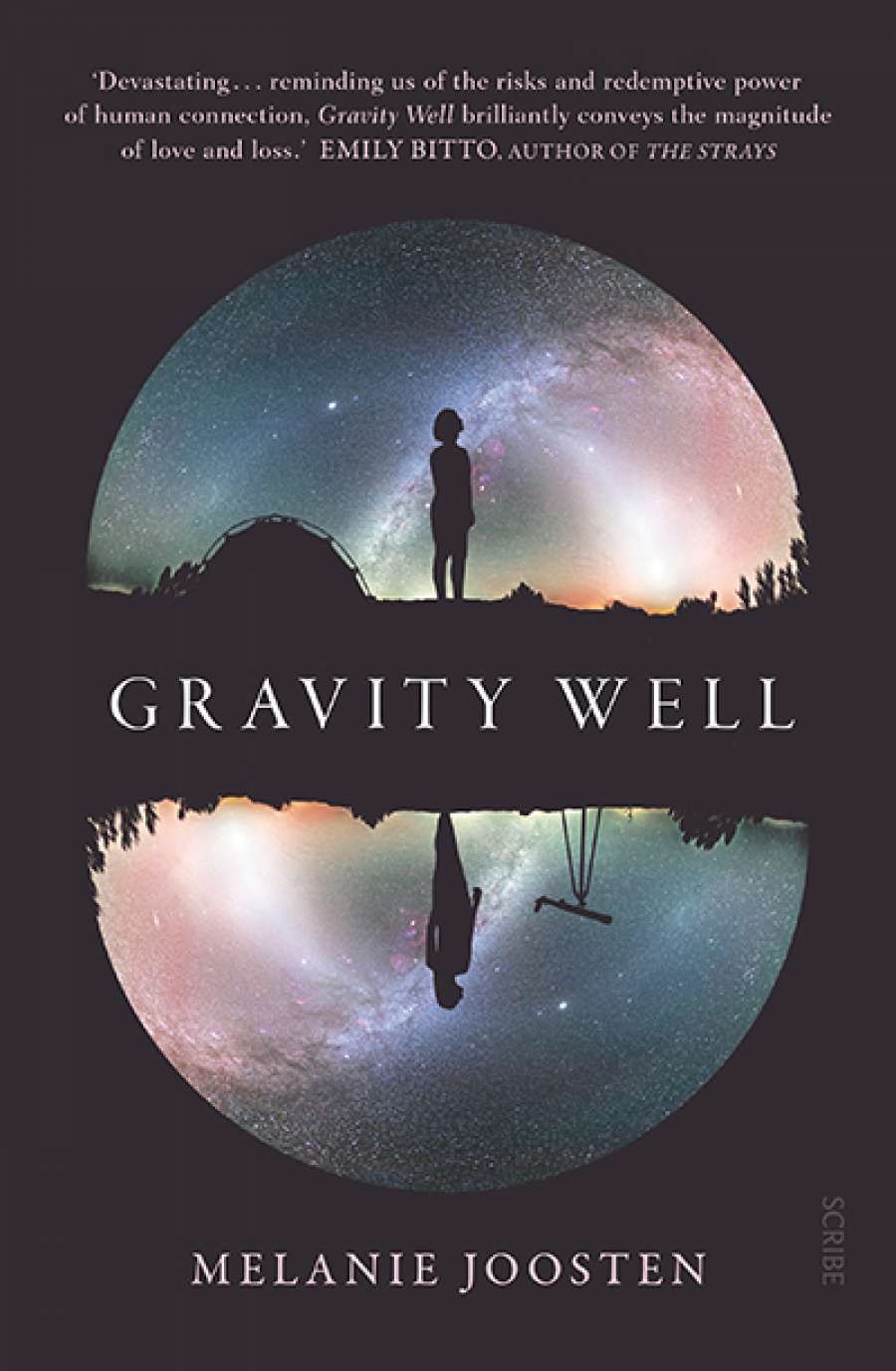
- Free Article: No
- Contents Category: Fiction
- Custom Article Title: Naama Grey-Smith reviews 'Gravity Well' by Melanie Joosten
- Review Article: Yes
- Online Only: No
- Custom Highlight Text:
Gravity Well opens with Carl Sagan’s famous ‘mote of dust suspended in a sunbeam’ quote, suggesting themes of astronomy, loneliness, and humanity’s cosmic insignificance. Though I was immediately smitten with the cover design (a nebula-coloured orb, its top and bottom halves depicting mirrored but not identical female silhouettes amid a sea of cosmic black), I worried that the novel might overdo the astronomy analogies. Yet it soon became apparent that Melanie Joosten’s writing is as subtle as it is intelligent. The astral references are frequent but add interest and depth. All appear well-researched, and many – such as the Voyager Golden Records – sent me googling for more.
- Book 1 Title: Gravity Well
- Book 1 Biblio: Scribe, $29.99 pb, 281 pp, 9781925322057
Though Lotte and Eve are both convincing characters, they are not always easy to like: they nurture their malcontent with self-flagellation and occasional cruelty to their ‘kind and solicitous’ husbands. Both fear that they will be unwanted; they put emotional and sometimes physical distance between themselves and those they love in what forms the novel’s central image of ‘the complications of family as a solar system: each person like a planet [...] influencing the paths of their companions’. Independent Lotte can be self-centred (later we learn why, in a satisfying plot twist), while Eve is convinced ‘she had lost the right to assert her own needs’. So why do we stick with these flawed protagonists? Because Joosten is in control of her material. She shows us, quietly and deliberately, that Lotte herself is ‘itching with annoyance the provenance of which she couldn’t face’.
Melanie Joosten has to date published three very different books. Her début, Berlin Syndrome (2011), is a psychological thriller. A Long Time Coming (2016) is a collection of essays on old age. Gravity Well is a family drama. While I was writing this piece, ABR published Anwen Crawford’s one-and-a-half-star review of Cate Shortland’s film adaptation of Berlin Syndrome, which was soon followed by equally unflattering critiques elsewhere. I knew the movie was due out that week: it was the reason I couldn’t get hold of Joosten’s novel on which the film is based, as Perth bookstores awaited the imminent release of the tie-in edition. Deadline looming, I opted for the ebook.
While all this movie talk may have little bearing on Joosten’s own writing, it did make me reflect on the extent to which an author’s ‘then’ affects their ‘now’. Should a book be considered in its own terms, or in the greater context of a writer’s creative output?
Well, both. After reading Mr Vertigo as a teenager, I reached next for The Music of Chance and In the Country of Last Things, and there are things I got from a Paul Auster phase that I wouldn’t from a single Auster. In art, obsession is often rewarded. Then again, it is not unusual to hear a friend lament their lost admiration for an author they once loved, their favourite books tainted by those they wish they hadn’t read.
 Melanie JoostenOn its own terms, Gravity Well is a quiet, intelligent story about loneliness and friendship, about grief tempered by hope. I admired Joosten’s thrilling plot-twist just past the halfway mark, and her beautiful imagery – from ‘the thick northerly wind buffeting every surface so that breathing was like drinking’, to a coast in its changing moods, ‘the midday sun stripping the landscape of depth, pulling every part of the view onto the same plane’. Eve’s job as an acoustic engineer gives Joosten cause to explore aural landscapes, too, and these finely observed descriptions make Gravity Well a pleasure to read.
Melanie JoostenOn its own terms, Gravity Well is a quiet, intelligent story about loneliness and friendship, about grief tempered by hope. I admired Joosten’s thrilling plot-twist just past the halfway mark, and her beautiful imagery – from ‘the thick northerly wind buffeting every surface so that breathing was like drinking’, to a coast in its changing moods, ‘the midday sun stripping the landscape of depth, pulling every part of the view onto the same plane’. Eve’s job as an acoustic engineer gives Joosten cause to explore aural landscapes, too, and these finely observed descriptions make Gravity Well a pleasure to read.
Once I had read Berlin Syndrome, Gravity Well took on an eerier edge in my mind, filtered as it were through its dark lens (I leave my gendered analysis of Berlin Syndrome for another time). Common stylistic and thematic preoccupations became apparent. Both novels explore the power dynamic of an intimate relationship – between lovers in the former, friends in the latter. Both probe the relationship in an intensely domestic setting while alternating perspectives between the two central characters. And both represent the psychological effects of trauma through disrupted chronology. But where Berlin Syndrome has a high-concept premise (as expected from a thriller), Gravity Well takes the less extreme setting of a family home in Ballarat. Here the characters are troubled but not psychotic, their failings and betrayals familiar. The story thus relies more heavily on the strength of Joosten’s writing – and a steady pillar it is. The cover quotes for Gravity Well are penned by 2015 Stella Prize winner Emily Bitto and 2017 Stella shortlistee Emily Maguire. It won’t be surprising to see Melanie Joosten’s name on next year’s list.


Comments powered by CComment